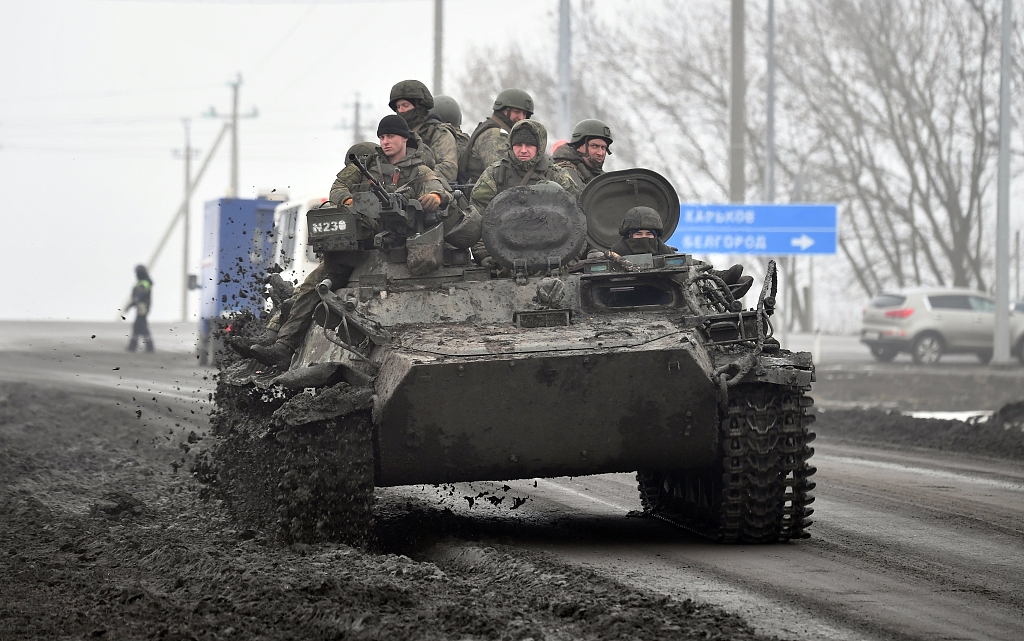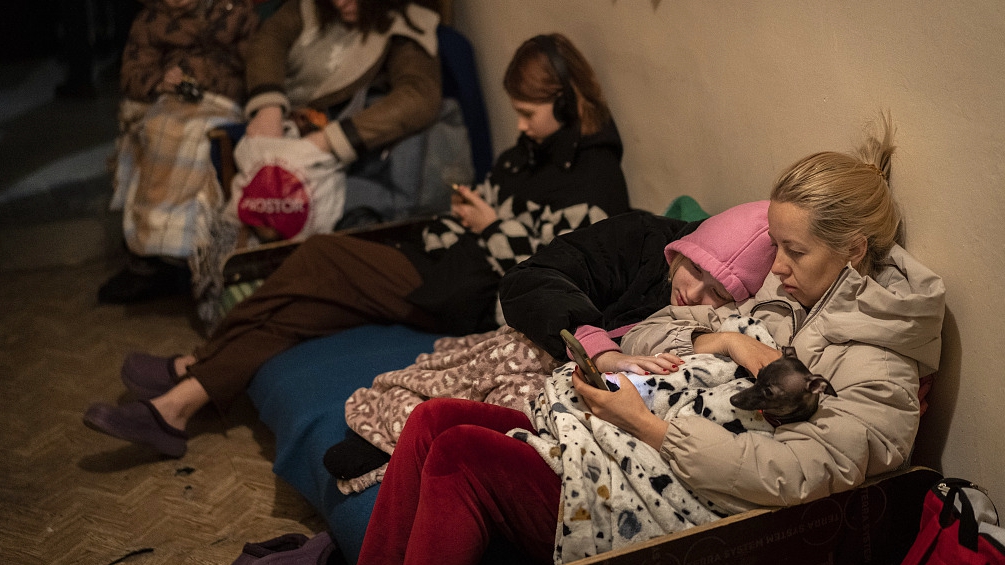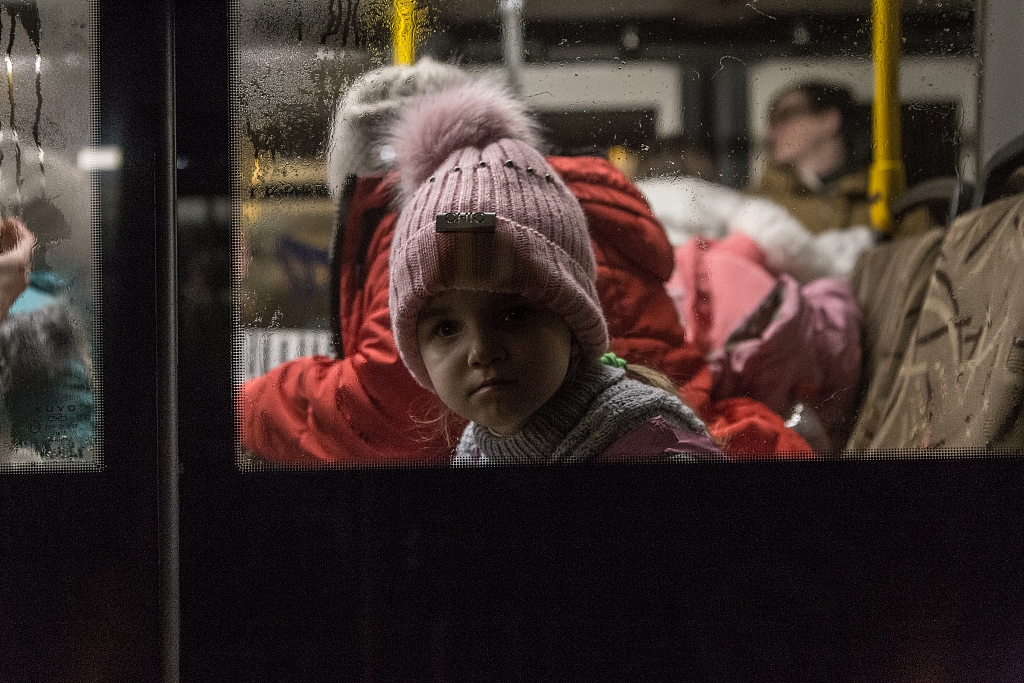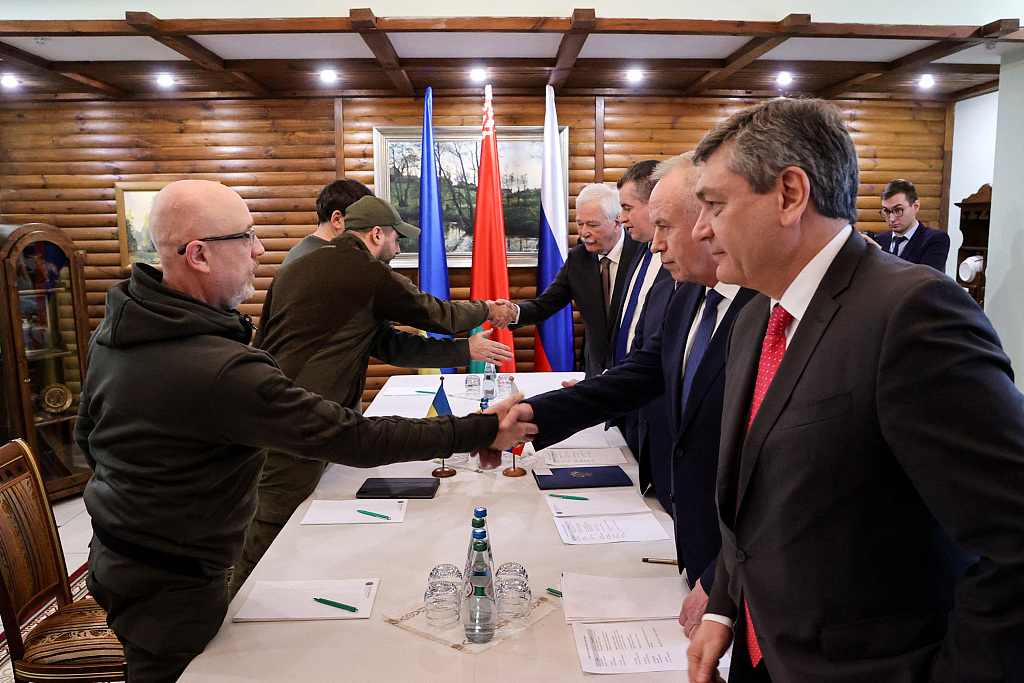03:48

One month into the Russia-Ukraine conflict, it is still unclear when and how this crisis will end.
Fighting has been going on in various parts of Ukraine for weeks, showing little sign of a turning point. Russia and Ukraine have held four rounds of peace talks and a meeting between their foreign ministers, without achieving a decisive breakthrough. And there have been mounting concerns about the humanitarian situation in Ukraine.
Meanwhile, the United States and its allies have been escalating sanctions against Russia. Moscow has hit back with a series of countermeasures.
Russian President Vladimir Putin announced a "special military operation" in the Donbas region in eastern Ukraine on February 24, but the offensive quickly spread across Ukraine. Russian forces captured the Chernobyl nuclear power plant in the north of Ukraine and Snake Island in the Black Sea on the first day of fighting.
Ukraine severed diplomatic ties with Russia and imposed martial law hours after Russia's offensive began. Ukrainian President Volodymyr Zelenskyy signed a decree ordering a general mobilization. The Ukrainian parliament extended martial law for 30 days starting March 26.

A Russian military vehicle moves along a road near the border with Ukraine in Belgorod region, Russia, March 2, 2022. /CFP
A Russian military vehicle moves along a road near the border with Ukraine in Belgorod region, Russia, March 2, 2022. /CFP
Russian forces began to advance on Ukraine's capital Kyiv on February 25. Heavy fighting was reported in Kyiv and its surrounding areas in the following weeks. Zelenskyy posted several self-made videos to dispel rumors that he had left the capital.
Shelling, air strikes and fighting were also reported in several other Ukrainian cities during the past month, including Kharkiv in the northeast, Kherson, Mykolayiv and Nikolaev in the south, Berdyansk and Mariupol in the southeast, Chernihiv in the north, and Rivne and Lviv in the west.
Russian troops took control of Berdyansk on February 27, Kherson on March 2 and the Zaporizhzhia nuclear power plant on March 4. Russia claimed on February 28 that it had taken control of the entire airspace of Ukraine. During the past few days, the siege of Mariupol has become a key focus of the conflict.
The Russian Defense Ministry said on March 14 that Russian forces had destroyed 3,920 targets of Ukrainian military infrastructure sites.
02:27

The General Staff of the Ukrainian Armed Forces said on March 12 that Russia's advance had slowed down and had been stopped at many places.
Moscow and Kyiv released conflicting numbers of casualties. The Russian Defense Ministry said on March 2 that 498 Russian and 2,870 Ukrainian troops had been killed since the outbreak of the conflict, while Zelenskyy said over 7,000 Russian servicemen were dead.
Russia has not published casualty numbers since then. Zelenskyy said on March 12 that around 1,300 Ukrainian troops had lost their lives.
The Ukrainian Foreign Ministry said on March 17 that around 14,000 personnel from the Russian armed forces had been killed. The New York Times put the death toll of Russian troops at more than 7,000 in a report on March 16, citing "American intelligence estimates."
The UN human rights office (OHCHR) said it had recorded 2,421 civilian casualties in Ukraine – 925 killed and 1,496 injured – as of midnight on March 20.
UN High Commissioner for Refugees Filippo Grandi tweeted on March 20 that 10 million people had fled their homes in Ukraine, either internally displaced or as refugees abroad. The UN said last week that more than three million Ukrainian refugees have fled the country.

Fifteen buses evacuating over 1,000 people from Mariupol through a humanitarian corridor arrive in Zaporizzja, Ukraine, March 22, 2022. /CFP
Fifteen buses evacuating over 1,000 people from Mariupol through a humanitarian corridor arrive in Zaporizzja, Ukraine, March 22, 2022. /CFP
The rivalry off the battlefield has been equally fierce.
The U.S. and its allies in Europe and other parts of the world imposed wide-ranging sanctions against Russia, including closing their skies to Russian airlines, blocking Russian banks from accessing the SWIFT international payment system, and banning imports of Russian oil.
In the meantime, the U.S. and its allies increased military assistance to Ukraine. U.S. Secretary of Defense Lloyd Austin said on Sunday that the total amount of U.S. military assistance to Ukraine had reached $2 billion.
Moscow responded with various countermeasures. On February 27, Putin ordered Russia's deterrence forces to be placed on "a special mode of combat duty." On March 7, the Russian government issued a list of "unfriendly" countries and regions including the U.S., Britain and EU member states. On March 15, Russia imposed sanctions against 13 senior U.S. officials including President Joe Biden, Secretary of State Antony Blinken, Secretary of Defense Lloyd Austin and Chairman of the Joint Chiefs of Staff Mark Milley.
Zelenskyy called on NATO to establish a no-fly zone in Ukraine, despite the bloc's refusal to get into a direct military conflict with Russia. Putin warned that approving a no-fly zone over Ukraine would be seen as declaring war against Russia.
Russian and Ukrainian delegations held three rounds of face-to-face peace talks on February 28, March 3 and March 7. The fourth round of negotiations, held virtually, began on March 14. Russian Foreign Minister Sergei Lavrov and Ukrainian Foreign Minister Dmytro Kuleba met in Turkey's Antalya on March 10, which was the meeting at the highest level between the two sides since the start of the conflict.
Besides agreeing to organize humanitarian corridors to evacuate civilians, the two sides have not made major breakthroughs in their talks. Key issues being discussed include neutrality for Ukraine with security guarantees and the status of Crimea as well as Donetsk and Luhansk in the Donbas region.

Russian and Ukrainian negotiators shake hands before their second round of peace talks in Belarus, March 3, 2022. /CFP
Russian and Ukrainian negotiators shake hands before their second round of peace talks in Belarus, March 3, 2022. /CFP
Zelenskyy on February 28 filled application forms requesting Ukraine's entry into the European Union. However, he said on March 15 that Ukraine should "accept the truth and recognize" that it will not become a member of NATO.
The Ukrainian president said repeatedly that he was ready to meet with Putin, while Moscow said it was too early for the two presidents to meet as there is yet to be a breakthrough in the peace talks.
Zelenskyy said in an interview on Monday that "formats of compromises in Ukraine-Russia negotiations will be decided on an all-Ukrainian referendum."
There was also a "war of words" between Moscow and Washington, as the two sides traded barbs at UN meetings and on other occasions. Russia accused the U.S. of funding a military biological program in Ukraine, which the U.S. denied and accused Russia of spreading disinformation. Biden branded Putin a "war criminal" – a comment that the Kremlin slammed as "unacceptable and unforgivable."
The Chinese diplomats and officials repeatedly stressed Beijing's position on the Ukraine crisis.
During his virtual summit with French President Emmanuel Macron and German Chancellor Olaf Scholz on March 8, Chinese President Xi Jinping said China maintains that the sovereignty and territorial integrity of all countries must be respected, the purposes and principles of the UN Charter must be fully observed, the legitimate security concerns of all countries must be taken seriously, and all efforts that are conducive to the peaceful settlement of the crisis must be supported.
Chinese State Councilor and Foreign Minister Wang Yi later said the "four musts" highlighted by Xi are China's clearest and the most authoritative attitude on the Ukraine issue.

Humanitarian aid supplies sent by the Red Cross Society of China to the Ukrainian Red Cross Society are transported in Warsaw, Poland, March 15, 2022. /Xinhua
Humanitarian aid supplies sent by the Red Cross Society of China to the Ukrainian Red Cross Society are transported in Warsaw, Poland, March 15, 2022. /Xinhua
Xi and Biden exchanged views on the situation in Ukraine during a video call on March 18. Xi said China makes a conclusion independently based on the merits of each matter, advocates upholding international law and universally recognized norms governing international relations, and adheres to the UN Charter and promotes the vision of common, comprehensive, cooperative and sustainable security.
Sweeping and indiscriminate sanctions would only make the people suffer, he said. If further escalated, they could trigger serious crises in global economy and trade, finance, energy, food, and industrial and supply chains, crippling the already languishing world economy and causing irrevocable losses, he added.
Xi stressed that the pressing priority is to keep the dialogue and negotiation going, avoid civilian casualties, prevent a humanitarian crisis, and cease hostilities as soon as possible.
An enduring solution would be for major countries to respect each other, reject the Cold War mentality, refrain from bloc confrontation, and build step by step a balanced, effective and sustainable security architecture for the region and for the world, he told Biden.
China put forward a six-point initiative on the humanitarian situation in Ukraine. The Red Cross Society of China provided humanitarian aid supplies worth 5 million yuan (roughly $800,000) to Ukraine earlier this month. The Chinese Foreign Ministry announced on Monday that China will provide an additional 10 million yuan (roughly $1.6 million) of humanitarian assistance to the country.
(Cover: A view of the destroyed Retroville shopping mall in Kyiv, Ukraine, March 21, 2022. /CFP)

